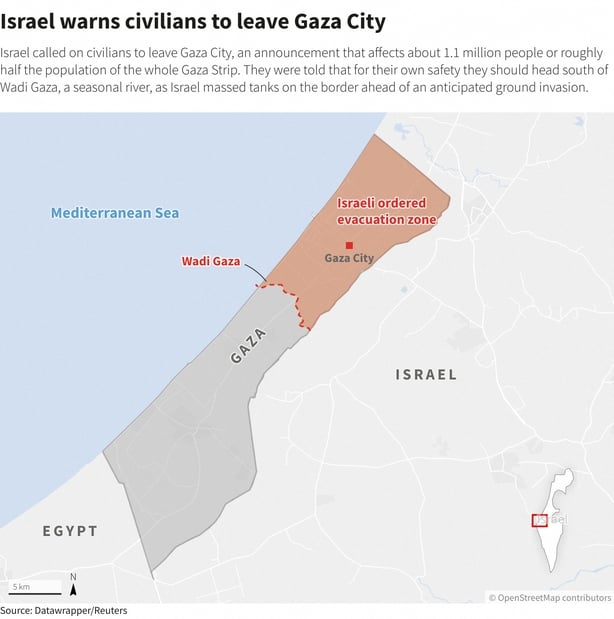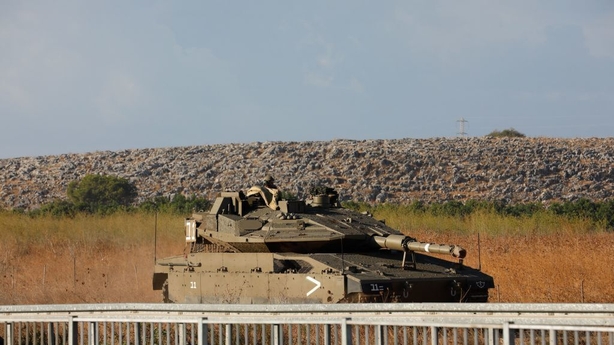Israel's Prime Minister Benjamin Netanyahu vowed on Sunday to "demolish Hamas"as his military prepared to move into Gaza in search of Islamist militants.
Israel has told Gazans to evacuate south, which hundreds of thousands have already done in the enclave that is home to more than 2 million people, about half in Gaza City.
Inside besieged Gaza, where conditions are deteriorating and deaths from Israeli air strikes rising, civilians said they were not safe anywhere. Militant group Hamas, which runs Gaza, has told them to ignore Israel's message to move south.
Conditions are so atrocious that Palestinian health workersare storing bodies in ice cream freezer trucks because moving them to hospitals is too risky and cemeteries are full.
With fears of the conflict spilling over, US Secretary of State Antony Blinken continued his rapid tour of Middle East states, seeking to prevent escalation and secure the release of 126 hostages Israel says were taken by Hamas back into Gaza.
Arab leaders stressed the need to protect Gaza civilians.
"The reaction went beyond the right to self-defence, turning into collective punishment," said Egypt's President Abdel Fattahal-Sisi of Israel's retaliatory strikes.
Renewed clashes on Israel's border with Lebanon on Sunday underscored the dangers of regional spillover.
Hamas' armed wing Al Qassam Brigades said it fired 20 rockets from Lebanon on two Israeli settlements while Lebanon's Iran-backed group Hezbollah said it targeted barracks in Israel's Hanita with missiles and had inflicted casualties.
Israel said it was striking Lebanon in retaliation.
Netanyahu convened Israel's expanded emergency cabinet, including former opposition lawmakers, in a show of unity. "Hamas thought we would be demolished. It is we who will demolish Hamas," he said.
Israel is carrying out the most intense bombardment Gaza has ever seen in response to the killing of 1,300 people when Hamas fighters rampaged through Israeli towns on 7 October. They shot men, women, children and soldiers and seized hostages in the worst attack on civilians in Israel's history.
Gaza bombardment
Authorities in Gaza said more than 2,450 people had been killed in Israel's retaliatory strikes so far, a quarter of them children, and nearly 10,000 wounded. Hospitals are running short of supplies and struggling to cope with the flow of injured.
Among them was four-year-old Fulla Al-Laham, 14 members of whose family, including her parents and siblings, died in an Israeli air strike.
"May God keep me alive to take care of her," said her grandmother Um Muhammed Al-Laham, who held the little girl's hand as she lay in a hospital with a bandaged arm and on a drip.
The Palestinian Health Ministry said 300 people had been killed and 800 more injured in Gaza during the last 24 hours.
The Israeli military on Friday told residents of the northern half of Gaza - which includes Gaza City's more than one million residents - to move south immediately.
"Hamas is trying to prevent your evacuation. We will enable it southward. Leave Gaza City and all the surrounding areas for the sake of your personal security," reiterated chief Israeli imilitary spokesperson Daniel Hagari on Sunday.

Some Palestinians who went south said they were heading backnorth because they were attacked wherever they went.
Hussam Abu Safiya, an intensive care doctor on a children's ward at the Kamal Edwan hospital in northern Gaza, said the order to evacuate was impossible.
"In this ward as you can see, there are children who are attached to ventilators, and now we have been asked to evacuate the hospital, where should we evacuate these children?"
The World Health Organization said Israel's orders for the evacuation of 22 Gaza hospitals were a "death sentence for thesick and injured".
Hamas has said dozens of people were killed in strikes on cars and trucks carrying refugees south on Friday. Reuters couldnot independently verify this claim.
'Nakba' trauma
The events are reminding Palestinians of the "Nakba," or "catastrophe," when many were forced from their homes during the 1948 war that accompanied Israel's creation.
US Secretary of State Anthony Blinken said he had a productive meeting with Saudi Crown Prince Mohammed bin Salman in Riyadh on Sunday before heading to Egypt. He will travel to Israel again on Monday.
Salman said Saudi Arabia was working hard to try to prevent the conflict escalating and wanted to help lift the siege.
The violence in Gaza has been accompanied by the deadliest clashes at Israel's northern border with Lebanon since 2006.
Netanyahu's national security adviser has warned Hezbollah not to take action that could lead to Lebanon's "destruction".
Iran has lauded the Hamas attack on Israel but denied any involvement. Hamas said in a statement on Saturday it and Iran had "agreed to continue co-operation". "If the crimes of the Zionist regime, including the massacre of people and the siege of Gaza, do not stop, the situation will become more complicated and it will escalate," Iranian PresidentEbrahim Raisi told France's President Emmanuel Macron in a call, state media said on Sunday.

Read more:
Sinn Féin's world view comes into focus after Hamas attack
Death toll rises, chaos reigns as invasion of Gaza inevitable
'Humanitarian ceasefire'
In New York, Russia asked the UN Security Council to vote tomorrow on a draft resolution on the Israel-Hamas conflict that calls for a humanitarian ceasefire and condemns violence against civilians and all acts of terrorism.
US President Joe Biden called Mr Netanyahu yesterday and, while reiterating "unwavering" support for Israel, discussed international co-ordination to ensure innocent civilians have access to water, food and medical care.
Mr Biden also spoke to Palestinian President Mahmoud Abbas, who stressed the urgent need to allow humanitarian aid corridors in Gaza.
The US Department of Defence said the Eisenhower aircraft carrier strike group would start moving towards the eastern Mediterranean to join another carrier strike group already there.
Defence Secretary Lloyd Austin said it was "part of our effort to deter hostile actions against Israel or any efforts toward widening this war following Hamas's attack on Israel".
We need your consent to load this Datawrapper contentWe use Datawrapper to manage extra content that can set cookies on your device and collect data about your activity. Please review their details and accept them to load the content.Manage Preferences
The only route out of Gaza not under Israeli control is a checkpoint with Egypt at Rafah.
Egypt officially says its side is open, but traffic has been halted for days because of Israeli strikes.
Egyptian security sources said the Egyptian side was being reinforced and Cairo had no intention of accepting a mass influx of refugees.
A US State Department official said the United States was working to open the crossing to let some people out, and had been in touch with Palestinian-Americans who want to leave Gaza.
Washington later said it had told its citizens to try to reach the crossing.
Pope calls for humanitarian corridors to help those under siege in Gaza
Pope Francis has called for humanitarian corridors to help those under siege in Gaza and renewed his appeal for the release of hostages held by Hamas.
"I strongly ask that the children, the sick, the elderly,women and all civilians do not become victims of the conflict," the Pope said during his weekly address to the crowds in St Peter's Square.
"Humanitarian right must be respected, above all in Gaza."
Additional reporting: Reuters






